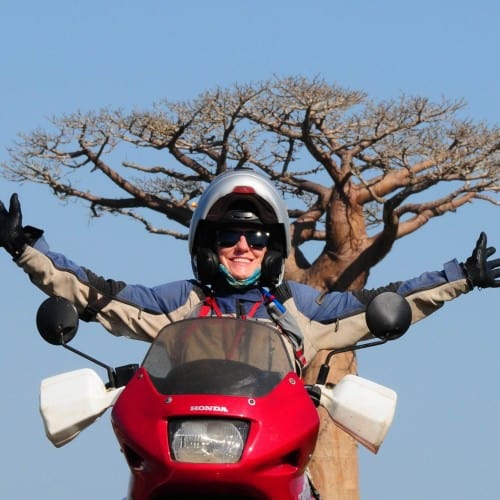 We have now ridden the west, the south and the east of Madagascar – so across the great Divide the separates the dry west from the wet east and done the Divide to the desert/savannah land of the south. While climatically it is a country of contrasts there are some constants, some good some not so good.
We have now ridden the west, the south and the east of Madagascar – so across the great Divide the separates the dry west from the wet east and done the Divide to the desert/savannah land of the south. While climatically it is a country of contrasts there are some constants, some good some not so good.
First the Malagasy people are superb with a sense of community that we don’t see that common nowadays, everything they get they share and there is a realisation that they’re all in the same boat, albeit one of very modest resources so they pool their efforts and really help each other. With that comes a sense of courtesy and respect for each other and for visitors that is exemplary. But another constancy is that the population here just keeps burgeoning, the pressure on resources to produce just a subsistence livings (67% below the poverty line and substantial numbers destitute) means that all natural resources are vulnerable to exploitation.
This leads to a rate of deforestation (for fuel) that is alarming and increasing since the political paralysis that descended in 2009 has spelled a damaging reduction in international aid. Madagascar’s status as a middle-of-the-road developing nation is a very distant memory now and sadly on all economic measures it is slipping quite rapidly.
As we identified in the Solomons on a visit earlier this year (a trip we did as part of our UNICEF work with the Morgan Foundation), birth control is a problem although child labour is an essential ingredient to family economic viability so the chicken and egg nature of reducing population pressure and boosting income prevails here even more than it does in the Solomons where there are simply far fewer natural resources for families to exploit. The infrastructure is deteriorating as the government’s budget has been slashed and villages get together as a community and do their own maintenance of roads, sanitation and water supplies. But without doubt economic well-being is decreasing. With the capital Antannanarivo there are some very well-off elites as is common in African Sates, corruption is rife and at the petty level with road police for instance proceeds from extortion is a significant source of income.
For all that this is a country well worth a visit, a pleasure to motorcycle, and provides a great learning experience for visitors interested in the socio-economic arrangements of this rather unique society as it grapples with poverty, population pressure and threats to its remaining biodiversity. We’ve ridden 3,300 kms and the road, village and forest experiences have made our stay thoroughly enjoyable.


Comments are closed.